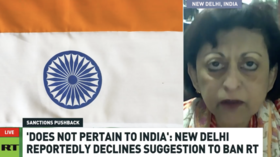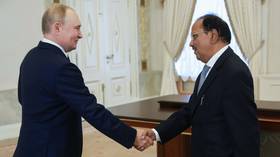India has ‘sovereign right’ to press freedom – ex-diplomat on sanctions against RT

India has the sovereign right to decide which media outlets its 1.4 billion people have access to, former Ambassador to the Netherlands Bhaswati Mukherjee has stressed during an interview with RT.
Her remarks come amid a new wave of US sanctions against RT and other Russian media outlets, as well as alleged pressure on New Delhi to join Washington’s worldwide “joint diplomatic campaign” to address “the threat posed by RT and other machinery of Russian disinformation.”
Blinken last week accused RT of “functioning as a de facto arm of [Russian] intelligence.” He further alleged that the news network has been trying to undermine democracy in the US and elsewhere, as well as erode global support for Ukraine.
Mukherjee stressed in the RT interview that India, as a country which fought for its independence from British colonial rule, believes in freedom of press.
“We are also a proud nation who got freedom from our colonizers in 1947. And we believe that we have the sovereign right to decide which channels our people should see and to select for ourselves information and reject disinformation,” she said. The diplomat noted the need to have access to “many different perspectives” in order to have an informed opinion on issues.
Speaking to RT, the former Indian diplomat agreed that New Delhi believes the right way to impose sanctions is through the UN Security Council. “We have never accepted pressure from outside on such issues,” she added.
“Any effort to put pressure on RT through the Global South is very unfortunate because it gives the impression that the Global South is not sovereign enough come to its own conclusions,” Mukherjee noted. “If we felt that RT was doing disinformation or propaganda, which is harmful for our national security, we would take our own steps to sanction it. We don’t believe that’s the case at all.”
The former diplomat noted that RT is presenting a perspective coming from Russia, which is as important as perspectives coming from Western media outlets. “We have the right to hear all perspectives and come to our own opinion,” she added.
On Monday, Meta, which owns Facebook and Instagram, announced that it would remove several Russian news outlets, including RT, from its platforms, citing alleged involvement in “foreign interference” operations.
The Hindu newspaper reported earlier, citing diplomatic sources, that New Delhi is reluctant to join Washington’s initiative to block RT and revoke the accreditation of its journalists. Indian officials told the newspaper “the debate on sanctions is not relevant to India,” as the country does not adhere to unilateral measures that are not imposed by the UN.
In the past, Indian Foreign Minister Subrahmanyam Jaishankar slammed the US-led sanctions against Moscow, arguing that they are not accepted by the developing world, which is bearing the brunt of such moves as they disrupt supply chains and increase global energy and food prices.













